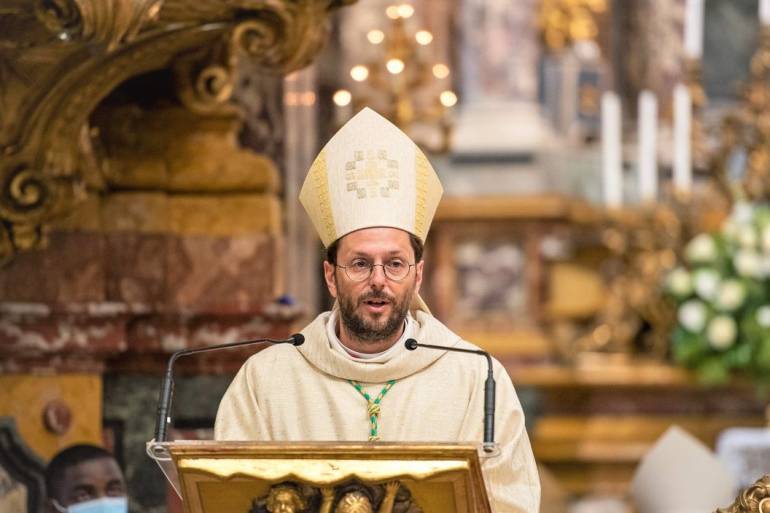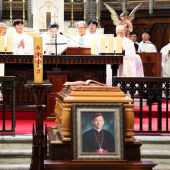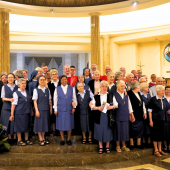Missionaries welcome the appointment of new cardinal in Mongolia

Missionaries of Mongolia welcomed Pope Francis’ appointment of Bishop Giorgio Marengo as a new cardinal along with 20 others around the globe.
Catholic missionaries who serve a tiny Catholic church with about 1,400 parishioners in Mongolia were amazed and delighted with the appointment.
Pope Francis on May 29 announced the elevation of 21 new cardinals including six from Asia. Marengo, the apostolic prefect of Ulaanbaatar, was one of them.
The newly elected cardinals will receive their red hats on August 27 at the Vatican.
The Italian-born Marengo will be 48 in June. He will be the youngest member of the Church's prestigious College of Cardinals.
Vatican news agency Fides spoke with Cardinal-elect Marengo about his reactions.
The pope's gesture, Marengo explained, was a missionary gesture to show thanks and care to a small community and to all the small communities of faithful scattered worldwide.
“Since I am a Consolata missionary, I give it to Mary, so that she can always intercede and guide me as I go on my journey. In the pope, I trust that God will lead me in the right direction,” he said.
The Ethiopian Consolata Sister Tireza Gabriel Usamo, who has been serving in Mongolia since 2018, said Marengo has been a gift to the Mongolian Catholic Church and has made a significant contribution to its strengthening as a leader.
Sister Usamo told UCA News that Marengo has made sincere efforts to improve relations with the government and promote interreligious dialogue.
Marengo recently visited the pope in Rome with a delegation of Catholics and Buddhists as part of his efforts to promote harmony.
In the Mongolian city of Arvaikheer, a Catholic handicraft centre for women, the nun said: “This is encouraging for unity and peace."
“In the name of the cardinal-elect Marengo, I thank God for him and pray for him and all the Christians in Mongolia,” she added.
Salesian Father Andrew Tin Nguyen said the appointment brings great joy to the tiny church at a time when it is preparing to commemorate its 30-year anniversary of revival.
There are 1,400 Christians in the "land of Genghis Khan" but the church has a very vibrant life thanks to 66 missionaries from 26 countries (25 priests, 34 nuns, three brothers and three lay missionaries) and only two Mongolian priests.
The newly-elected cardinal should make efforts to “raise his voice” to ease the difficulties missionaries face in the Central Asian country, Father Nguyen said.
"Missionaries face many difficulties, but have no real happiness, peace, or freedom to perform their work," he said.
“We are not heard, our voices are not heard, and we are controlled, checked, taxed by the government," he explained. “In other words, if we have a cardinal raising our voice, raising our work, raising our mission, government and people will hear us.”
A priest from St. John Bosco School Center in Darkhan city, about 253 kilometers southwest of Ulaanbaatar, said the newly appointed cardinal will help to improve relations between the church and government.
This will improve the relationship between the government and the Vatican as well as the evangelization and education of local people.
Pope Francis' pastoral priorities for peripheral churches have been hailed by a Czech missionary based in Ulaanbaatar, Father Jaroslav Vracovsky.
The pope has spoken of putting at the centre of attention the weakest and most abandoned, and the Catholic Church in Mongolia is probably one of the world's weakest churches.
Father Vracovsky said the appointment of a cardinal in the Mongolian Catholic Church was a confirmation of Pope Francis' pastoral criteria.
The appointment brings Mongolia's churches into the global spotlight, says the priest.
“We can hope that not only new missionary groups can come to Mongolia, but that the local Mongolian vocations will grow.” - Anbu Selvam
Radio Veritas Asia (RVA), a media platform of the Catholic Church, aims to share Christ. RVA started in 1969 as a continental Catholic radio station to serve Asian countries in their respective local language, thus earning the tag “the Voice of Asian Christianity.” Responding to the emerging context, RVA embraced media platforms to connect with the global Asian audience via its 21 language websites and various social media platforms.














